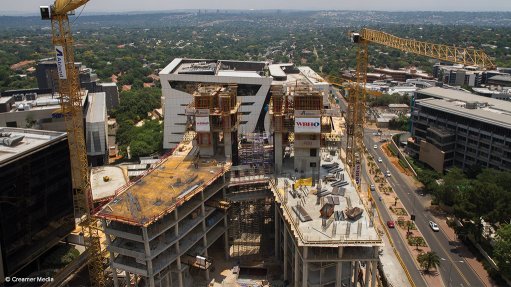
Wilson Bayley Holmes-Ovcon (WBHO) saw a strong recovery in the six months ended December 31, as it turned a R2-million profit for the comparative period in 2018 into a R264-million profit.
It seems the construction group is shaking off the effect of a botched roads project in Melbourne, Australia, although it still had to make a further A$20-million provision for anticipated losses as it wraps up the Western Roads Upgrade project.
Physical work on two of the eight road packages has now been completed, with the remaining six packages to be delivered between March and October.
Profitability in Australia was also impacted by delays on the 443 Queen street project in Brisbane.
The project entails construction of a A$200-million residential tower. A loss of A$12-million was recognised on the project due to a slippage against the original programme and cost overruns on subcontractor packages.
WBHO on Tuesday also announced a 14% increase in revenue for the six-month period, to R22.9-billion.
The group is active in the UK, Australia and Africa.
The building and civil engineering business reported a drop in operating profit from R163-million to R152-million.
Roads and earthworks saw a decline in operating profit from R167-million to R136-million.
Australian activities reported a loss of R174-million, compared with a R445-million loss in the previous period.
The UK business saw an increase in profitability, from R104-million, to R149-million.
WBHO’s total order book stood at R42.4-billion at December 31, which is a 10% decline from the R47.3-billion recorded on June 30.
The 15% increase in the order book of the building and civil engineering division was supported by a stronger order intake within the coastal regions over the period and the award of a 9 500-person camp in Mozambique.
The order book of the roads and earthworks division declined by 11%, mostly in South Africa.
The more selective bidding strategy implemented in Australia is reflected in the lower order book levels, as the business seeks to procure projects at acceptable margins and levels of risk, states the group.
In rand terms, the UK order book decreased by 19%. However, following the general election in this country, there seems to be a more positive outlook, primarily owing to reduced uncertainty and central government pledges on infrastructure spending.
‘Not since 2006’
With economic growth forecast below 1%, a potential sovereign downgrade and low business confidence, private investment in South Africa continued to wane, stated WBHO.
“This, combined with historic low levels of public spending from both government and State-owned entities (SOEs) struggling under debt constraints, has seen the construction industry endure its worst slump in decades.
However, WBHO added that reduced capacity within the local industry as a whole had allowed it to maintain activity levels over the short term with “the recent emergence of increased public spending from the more stable SOEs highlighting a promising pipeline of local work for certain divisions”.
New WBHO CEO Wolfgang Neff said on Tuesday that the construction industry had seen significantly more work flowing from SOEs such as Airports Company South Africa, the South African Natonal Roads Agency, Eskom and Transnet, with many of the contracts of substantial size and duration.
Chairperson Louwtjie Nel added that the construction industry had not seen this amount of activity since 2006, before the 2010 FIFA World Cup.
“It might be a blip, but it will carry us through the medium term – as long as all the contracts are awarded.”
He added that WBHO had lost 60 of its skilled, young professionals to companies abroad, owing to the uncertain political situation in South Africa, as well as the challenges experienced on construction sites.
Nel also believed that the local construction industry was the most transformed industry in South Africa, but that it often failed to be recognised as such by government.
Rest of the World
Markets in the rest of Africa offer various opportunities, said WBHO, although payment risk and onerous contractual conditions remained red flags on many projects.
As such, WBHO had decided to target those projects that matched its risk appetite, including Mozambican gas-related projects for both the roads and earthworks and civil engineering divisions.
Sentiment in Australia remained strong, with sufficient work available across the building and infrastructure markets, reported the construction group.
“Following the poor results achieved over recent years, identifying key risks at procurement stage, as well as improved project execution remain in sharp focus within the Australian operations.
“In the UK, with the London construction market demonstrating renewed signs of improved activity and the Manchester market benefitting from ongoing growth in the region, the UK operations should continue to contribute well toward overall performance.”